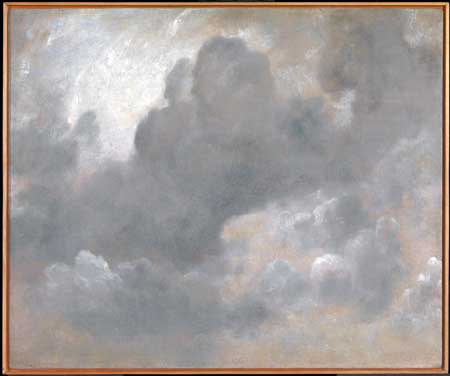Play (1979)
by Caryl Churchill
Directed by Lee Mikeska Gardner
The Nora Theatre Company
Central Square Theater
June 6-30, 2019
With Aislinn Brophy (Ellen, Mrs. Saunders, Cathy), Stephanie Clayman (Clive, Betty), Joshua Wolf Coleman (Betty, Martin), Marge Dunn (Joshua, Lin), Kody Grassett (Maud, Gerry), Sophori Ngin (Edward, Victoria), Alexander Platt (Harry Bagley, Edward)

“Cloud Study” (1822)
Tate Gallery, London
Don’t ask about the plot, which involves so many little innuendoes of relationship and subterfuges of interconnection that it’s too complicated to delineate. Nonetheless! The play is in two distinct acts, the first of which takes place in a British-ruled African colony during the late Victorian era, and the second of which takes place in contemporary (as of 1979 when the play was written) Britain.
In the first part, Clive (Stephanie Clayman), a colonial administrator of some sort, and his wife Betty (Joshua Wolf Coleman) are surrounded by their children, Victoria (played by a baby dummy doll) and Edward (Sophori Ngin). Servant Joshua (Marge Dunn) and governess Ellen (Aislinn Brophy) populate and complicate the relationships, as do friends Harry Bagley (Alexander Platt) and Mrs. Saunders (Aislinn Brophy). A lot of women’s roles are played by men, and vice versa. Joshua, a male black servant, is played by a white woman.
In the second part, Victoria (Sophori Ngin) is a grown woman, but not really the same woman who was the baby in the first part. Her brother is Edward (Alexander Platt), a gay man who is sometimes involved with Gerry (Kody Grassett). Meanwhile, Victoria, though married to Martin (Joshua Wolf Coleman), is having a lesbian affair with Lin (Marge Dunn). Betty (Stephanie Clayman), mother of Edward and Victoria, is trying to figure it all out.
The cross-dressing in the first act gives the vivid histrionic impression that this play is about the transformation of sexual identities while the second act exhibits the same point more straightforwardly. The dramatic curating of the Victorian era in this surrealistic mode is an interesting anticipation of the second-act survey of fluid sexual preferences in the contemporary world, reflecting the historic rigidities in a humorous and bizarre way.
Caryl Churchill has made a career of making plays that break conventions in all kinds of ways. Last year’s wonderful production of Blue Kettle and Here We Go by Commonwealth Shakespeare Company demonstrated the ways in which the attenuation of normal language still leaves a space in which emotional truth can radiate. In Cloud 9, the sexual antics that populate both parts of the temporal equation break apart the expectations of narrative and character to allow something genuine to emerge.
It’s remarkable, in a way, that this play, which is a total romp and breaks the general rules of narrative, manages, despite its considerable wandering and meandering about its characters and themes, to go anywhere at all. But it does, and one could well imagine that Churchill could have meandered even further than she does and still have captured something significant.
As with the great production of those two plays at Commonwealth last year, this one has been beautifully directed and staged (by Lee Mikeska Gardner) so that it’s craziness seems less disorienting than it might. What easily could be a poke-you-in-the-eye disarrangement of goings on, is, in this production, an enjoyable, though indeed rompified, excursion of several hours.
The play is not short – it runs about two hours and forty minutes – but it doesn’t usually feel long. There are places where a little watch gazing may take place, especially when one expects that the end has come and there is yet more variation on the craziness to follow. But, all in all, the experience is delightful, interesting, weird, compelling, and full of very good acting.
In the first part, I was particularly struck by Marge Dunn’s austere and forceful embodiment of Joshua, the servant, and by Aislinn Brophy’s extremely versatile portrayals of both Ellen, the governess, and Mrs. Saunders, the widowed “friend.”
Both of these actresses changed remarkably for the second half, as did the rest of the cast. Other actors had a bit more of a chance to shine in a vivid way in the second half. Alexander Platt, who plays the jaunty and perverted (but who isn’t in this play?) Harry Bagley in the first half, gets to play the gay Edward in the second half, and he carries off the transition nicely. Joshua Wolf Coleman, who plays a wildly histrionic Betty in the first half, takes on the role of Victoria’s (Sophori Ngin) husband Martin in the second half and turns into a quite transformed and sometimes sensitive new age guy. As Victoria in the second half, Sophori Ngin gets also to do her thing and brings to life a character torn between a female lover and a husband.
Overall: a very well done production of the wild and wacky play for which Caryl Churchill is probably best known.
– BADMan
Leave a Reply